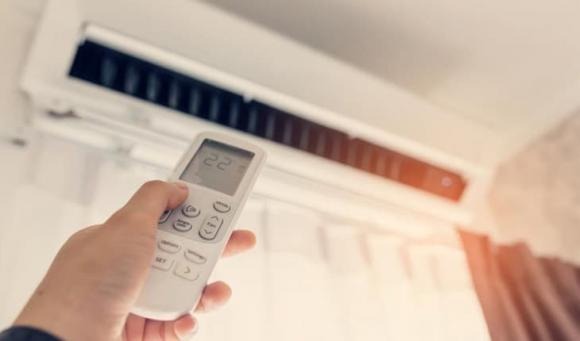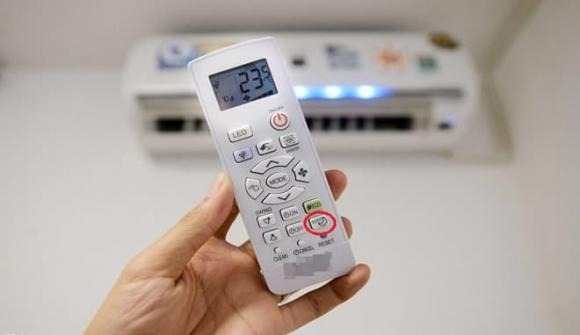Many people believe that setting the thermostat to 28-29 degrees Celsius is the most energy-efficient setting, but this is not actually the case. The most optimal and efficient setting usually comes from utilizing a specific feature on your remote control.
Air conditioners are an indispensable appliance during hot and humid weather. When using an air conditioner overnight, there are certain precautions to take in order to ensure both comfort and energy efficiency.
Does Setting the Air Conditioner to 28-29 Degrees Celsius Save Energy at Night?
According to experts, air conditioners operate most efficiently when the outdoor unit temperature is below 48 degrees Celsius and the indoor temperature is 19 degrees Celsius or higher. Optimal energy savings are typically achieved when the indoor temperature is only about 6 to 10 degrees Celsius cooler than the outdoor temperature.

According to experts, air conditioners operate most efficiently when the outdoor unit temperature is below 48 degrees Celsius and the indoor temperature is 19 degrees Celsius or higher.
For instance, if the outdoor temperature is 40 degrees Celsius, setting the air conditioner to 30 degrees Celsius will save energy while still providing adequate cooling. However, setting the unit to 25 degrees Celsius will force it to work harder, resulting in increased energy consumption. In cases where the outdoor temperature ranges from 30 to 35 degrees Celsius, setting the air conditioner to 26 to 28 degrees Celsius will be more energy-efficient. Leaving it at 30 degrees Celsius will cause the outdoor unit to work continuously, consuming more energy.
Why You Should Use the Sleep Mode When Sleeping at Night
Additionally, utilizing the Sleep mode at night not only promotes better health but also saves energy. When this mode is activated, the unit will automatically increase the temperature gradually after a set period of time, creating conditions that are more conducive to deep sleep. This not only helps users sleep more soundly but also significantly reduces energy consumption.

Additionally, utilizing the Sleep mode at night not only promotes better health but also saves energy.
Energy-Saving Tips for Using Air Conditioners
Avoid Running the Air Conditioner All Day
Running the air conditioner all day, even during hot weather, is not recommended as prolonged exposure to air-conditioned environments can lead to dehydration, dry skin, and sore throats. Furthermore, constant operation of the air conditioner will significantly increase your electricity bill and cause internal wear and tear, reducing the lifespan of the appliance.
Instead, on days when the weather is not excessively hot, consider using a fan instead of an air conditioner to conserve energy and maintain air circulation in the room.
Set the Thermostat to a Reasonable Temperature
Many people make the mistake of setting their air conditioner to the lowest possible temperature in order to cool down quickly. However, this can cause the unit to run at maximum capacity right away, leading to premature wear and tear and increased energy costs. Instead, set the temperature higher initially and gradually lower it over time.
The indoor temperature should be maintained between 24 and 28 degrees Celsius, which is the ideal range for the air conditioner to operate efficiently without creating a significant temperature difference from the outside. Remember, lower temperatures consume more energy.
Turn Off the Air Conditioner Before Leaving
Experts recommend turning off the air conditioner about 30 minutes before leaving. During this time, the temperature in the room will still be cool enough to be comfortable, and turning it off beforehand will help save energy. Additionally, gradually decreasing the temperature helps the body adjust and avoid thermal shock when going outdoors.
Use a Fan in Conjunction with the Air Conditioner
When initially turning on the air conditioner, turn on a fan as well. The fan will help distribute the cool air from the air conditioner throughout the room more quickly, reducing the time it takes to cool down. Once the room has reached a comfortable temperature, you can turn off the fan to conserve energy.
- Avoid running your air conditioner all day, as it can lead to dehydration and increased electricity costs. Use a fan instead on milder days.
- Set the thermostat to a reasonable temperature. Avoid extremely low settings as they strain the unit and increase energy costs. Gradually lower the temperature for optimal comfort and efficiency.
- Turn off your air conditioner about 30 minutes before leaving to save energy and help your body adjust to outdoor temperatures.
- Use a fan alongside your air conditioner to circulate cool air more quickly, reducing the workload on your AC unit.







































